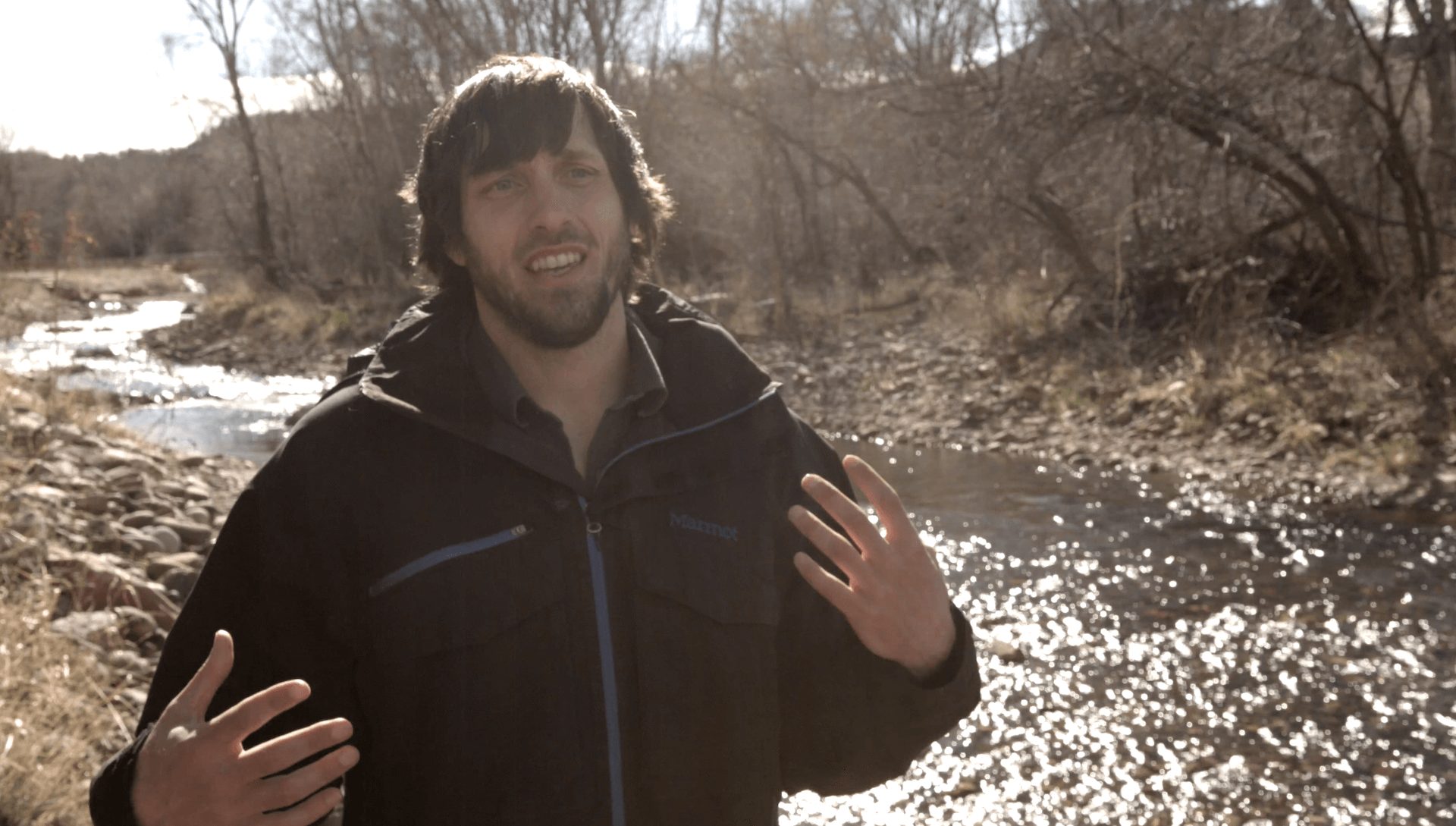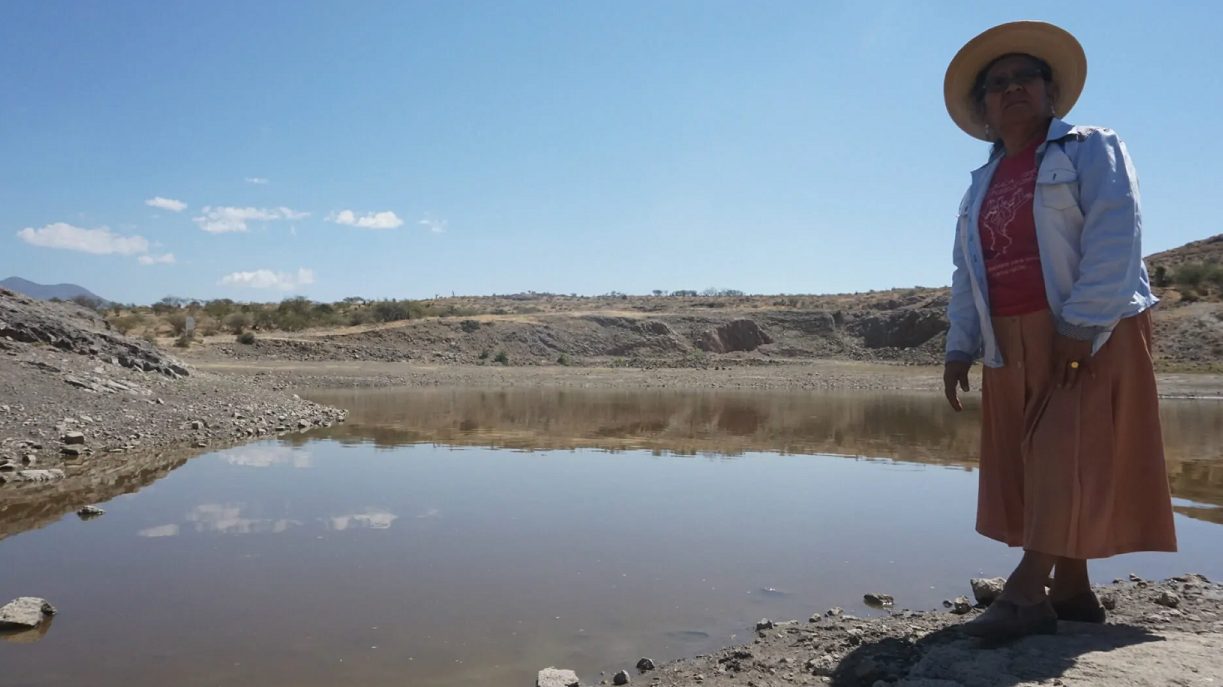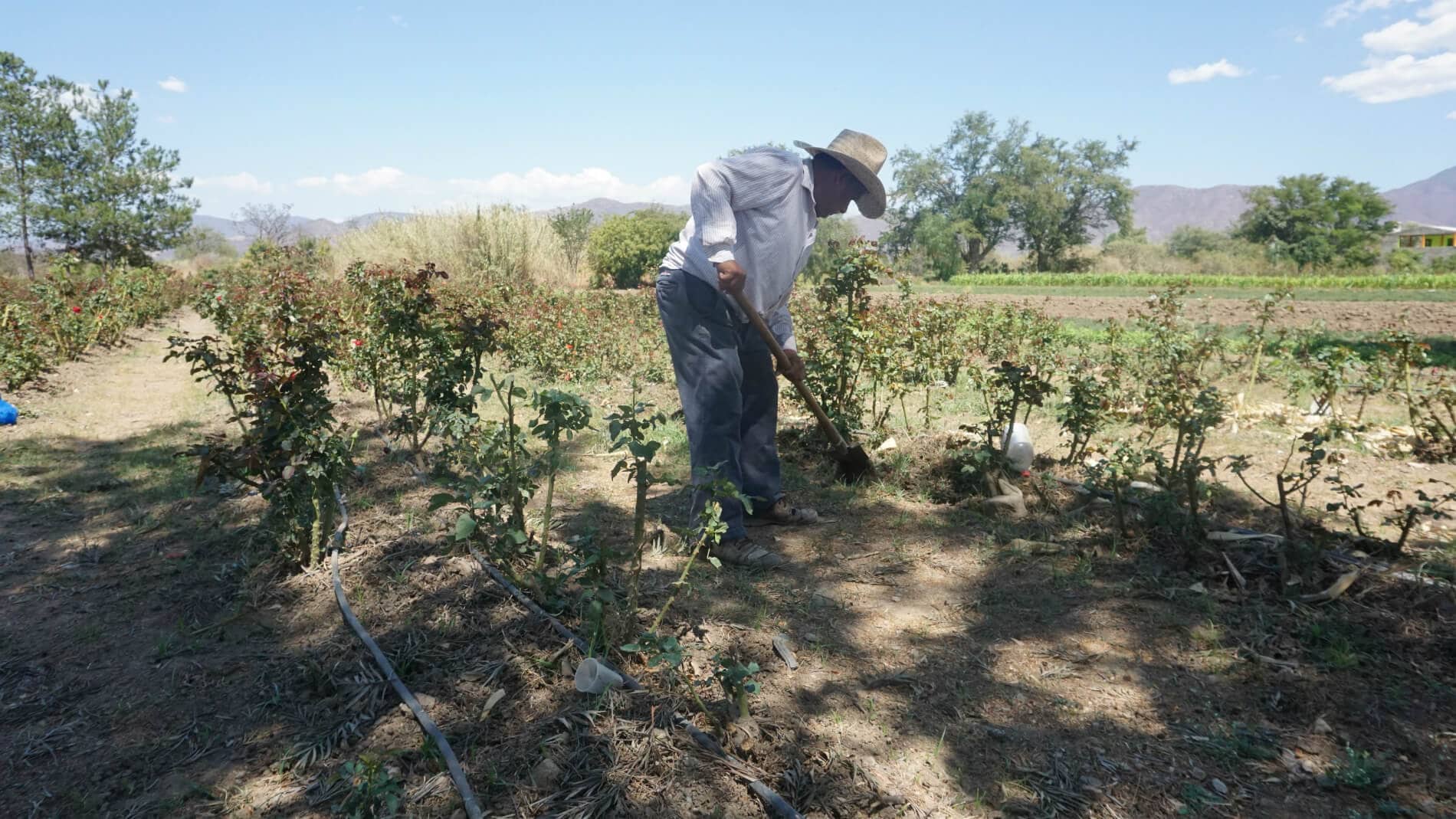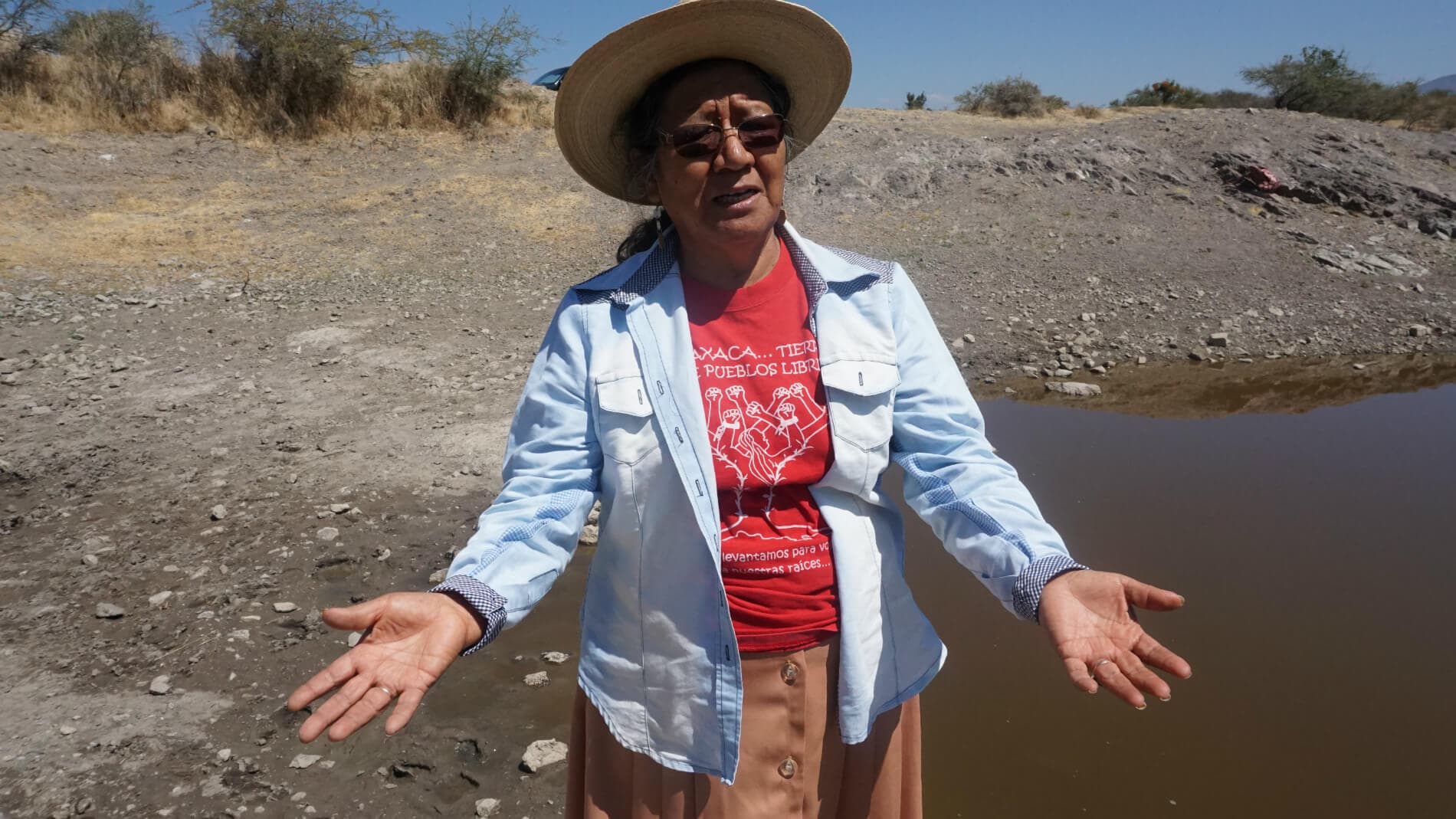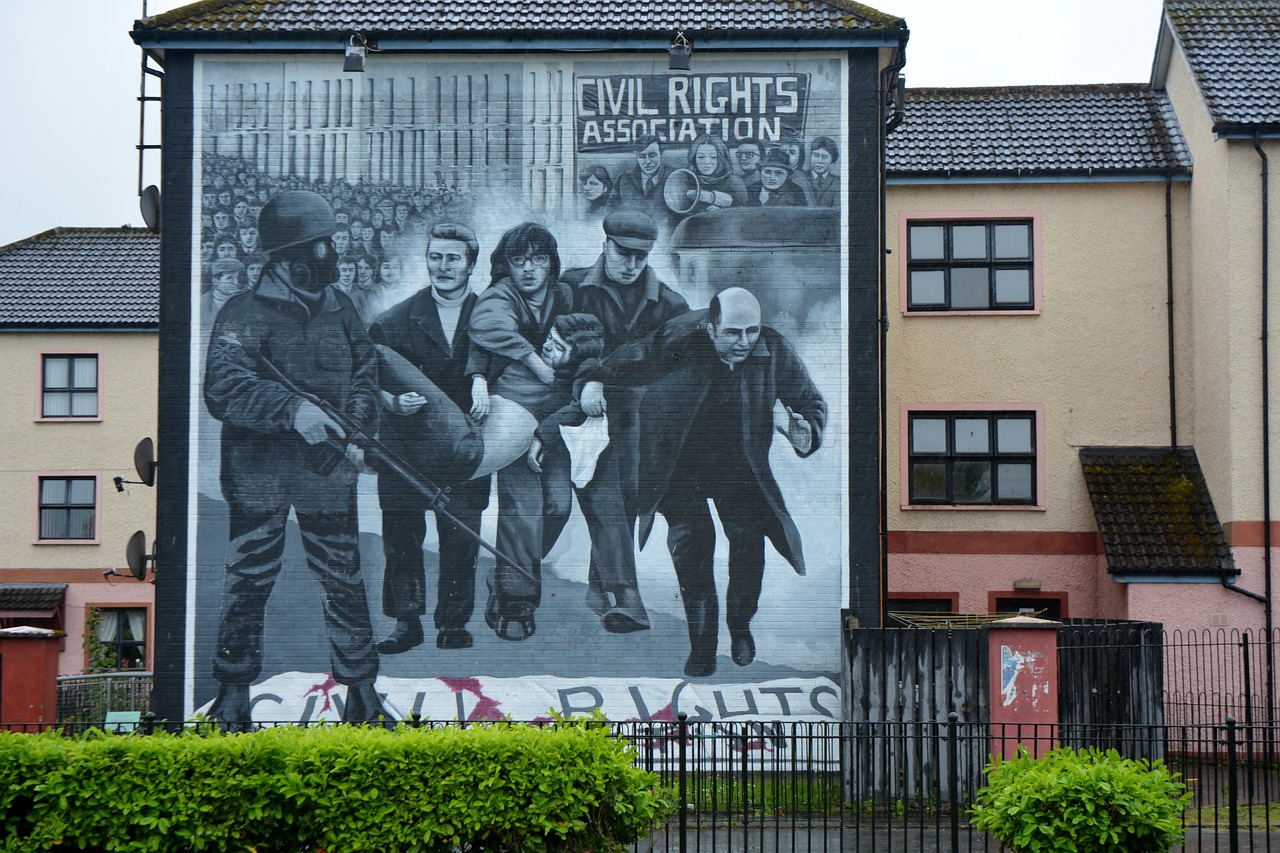
by DGR News Service | Jul 23, 2019 | Direct Action, Education, Strategy & Analysis
Editor’s note: this article contains extensive excerpts from the Irish Republican Army’s Green Book, one of their key training documents during their 20th-century struggle against British occupation.
Written by Liam Campbell
“Don’t be seen in public marches, demonstrations or protests. Don’t be seen in the company of known Republicans, don’t frequent known Republican houses. Your prime duty is to remain unknown to the enemy forces and the public at large.”
Like all successful underground organisations, the Irish Republican Army maintained a strict firewall between their aboveground and underground movements, this ensured that publicly identifiable individuals could not be pressured into revealing underground militants, providing a certain level of safety for both groups. The Irish Republican Army also emphasized the importance of abstaining from alcohol or other drugs, which they identified as the single greatest threat to any guerilla organisation.
“Many in the past have joined the Army out of romantic notions, or sheer adventure, but when captured and jailed they had after-thoughts about their allegiance to the Army. They realised at too late a stage that they had no real interest in being volunteers. This causes splits and dissension inside prisons and divided families and neighbours outside.”
When recruiting, the Irish Republican Army recognised that successful underground members had certain characteristics; they were intelligent, reliable, and they were capable of giving their total allegiance to the cause. These characteristics ensured that they would consistently obey often difficult orders from the chain of command, regardless of the personal cost, and despite any personal issues they may have with their superior officers. Certain qualities could disqualify a person as a candidate: emotionalism, sensationalism, and adventurism were among them.
“The enemy, generally speaking, are all those opposed to our short-term or long-term objectives. But having said that, we must realise that all our enemies are not the same and therefore there is no common cure for their enmity. The conclusion then is that we must categorise and then suggest cures for each category. Some examples: We have enemies through ignorance, through our own fault or default and of course the main enemy is the establishment.”
One of the most essential features of the Green Book was the precision with which it defined enemies. You cannot wage a successful war if your targets are poorly defined. The Irish Republican Army identified three categories of enemy:
Enemies through ignorance are those individuals who can be cured through education. Tactics included marches, demonstrations, wall slogans, press statements, publications, and person-to-person communication. The Green Book stressed that self education was essential, which included ideological understanding and also tactical knowledge about how to organise large groups of people and how to successfully execute different actions.
Enemies through our own fault are the ones created by the Irish Republican Army’s actions, which includes personal conduct and the collective conduct of the movement. These enemies vary greatly. The elderly woman whose door was pulled off its hinges by an IRA member evading capture who doesn’t receive an immediate apology and recompense, the family and friends of an informer who has been punished without their being notified of the reason, and also the collateral victims of violence.
Members of the establishment who consciously take actions to maintain the status quo in politics, media, policing, and business. Although some of these enemies are clearly identifiable, most of them operate with various degrees of anonymity as bureaucratic cogs in a vast machine of oppression; this means that one of the greatest challenges is accurately identifying establishment members. Surprisingly, execution is not always the best way to make a member of the establishment ineffective, often it is better to expose them as liars, hypocrites, collaborators, or subjects of public ridicule.
“Many figures of speech have been used to describe Guerrilla Warfare, one of the most apt being ‘The War of the Flea’ which conjured up the image of a flea harrying a creature of by comparison elephantine size into fleeing (forgive the pun). Thus it is with a Guerrilla Army such as the I.R.A. which employs hit and run tactics against the Brits while at the same time striking at the soft economic underbelly of the enemy, not with the hope of physically driving them into the sea but nevertheless expecting to effect their withdrawal by an effective campaign of continuing harassment contained in a fivefold guerrilla strategy.”
The Irish Republican Army’s strategy included a war of attrition, the destruction of high-value assets, to make large regions ungovernable, to sustain a propaganda campaign, and to protect the movement against criminals, collaborators, and informers. The Green Book emphasized that volunteers need to achieve more than just killing enemy personnel, they must also create and maintain support systems that would not only carry the movement through the war, but would also facilitate a smooth transition after military victory had been achieved.
“Most volunteers are arrested on or as a result of a military operation. This causes an initial shock resulting in tension and anxiety. All volunteers feel that they have failed, resulting in a deep sense of disappointment. The police are aware of this feeling of disappointment and act upon this weakness by insults such as “you did not do very well: you are only an amateur: you are only second-class or worse”. While being arrested the police use heavy-handed `shock` tactics in order to frighten the prisoner and break down his resistance. The prisoner is usually dragged along the road to the waiting police wagon, flung into it, followed by the arresting personnel, e.g., police or Army. On the journey to the detention centre the prisoner is kicked, punched and the insults start. On arrival he is dragged from the police wagon through a gauntlet of kicks, punches and insults and flung into a cell.”
Capture was one of the greatest fears that volunteers lived with on a daily basis, so the Green Book addressed these concerns in detail and prepared volunteers for that possibility. This section was broken down into the actual arrest, the interrogation, and the legal process. There were three categories of torture that volunteers could face: physical, subtle psychological, and humiliation. Physical torture often took the form of beatings, kicking, punching, and cigarette burns. Psychological torture could include threats to family, friends, and self, or threats of assassination and disfigurement. Humiliation included being stripped naked, remarks about the prisoner’s sexual organs, and removing symbolic defense mechanisms.
One of the ways the Green Book prepared volunteers was by reminding them that they could only be held and tortured for a maximum of 7 days. Although the experience would likely be horrific, it could only last for a relatively brief duration; if they confessed or capitulated during their interrogation they could easily face a lifetime in prison where they would experience much of the same torture. One of the coping strategies they employed was to form images in their minds or on the surrounding walls, directing their concentration away from the interrogators and diverting it toward positive or neutral ideas, even something as simple as a flickering candle or a leaf.
Overall, what the Green Book does is it clearly lays out the ideological foundations of the movement, the requirements of its volunteers, the methodology for identifying and categorising enemies, the tactics that should be employed, and it also addresses the greatest fears of volunteers and teaches them how to cope in the event that they must face them. These are the foundational psychological requirements that are needed to recruit and retain effective underground guerillas. They must know why they are taking action, what their actions will achieve, how to behave, who they are targeting, and they need to know that they will be able to overcome their fears should they need to face them.
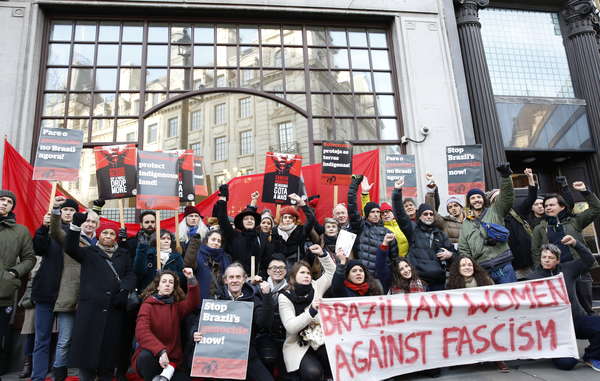
by Deep Green Resistance News Service | Jan 31, 2019 | Protests & Symbolic Acts
by Survival International
Protests against the anti-indigenous policies of Brazil’s President Bolsonaro are occurring in Brazil and around the world to mark his first month in power.
Demonstrators held placards declaring “Stop Brazil’s genocide now!” and “Bolsonaro: protect indigenous land.”
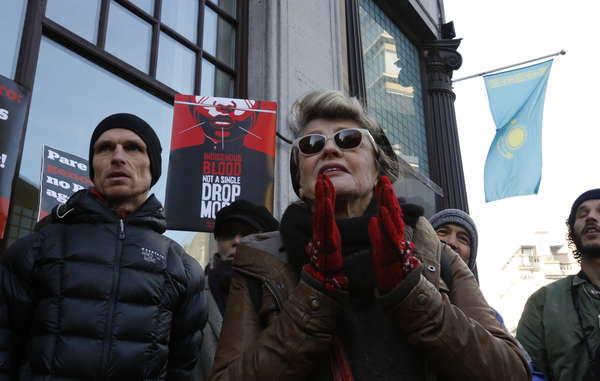
Oscar winning actor Julie Christie joins Survival protesters outside Brazils Embassy in London, calling on Bolsonaro to stop Brazil’s genocide. © Rosa Gauditano/APIB/Survival International
The protests have been
led by APIB, the Association of Indigenous Peoples of Brazil, as the culmination of their “Indigenous blood – not a single drop more” campaign, known as “Red January.”
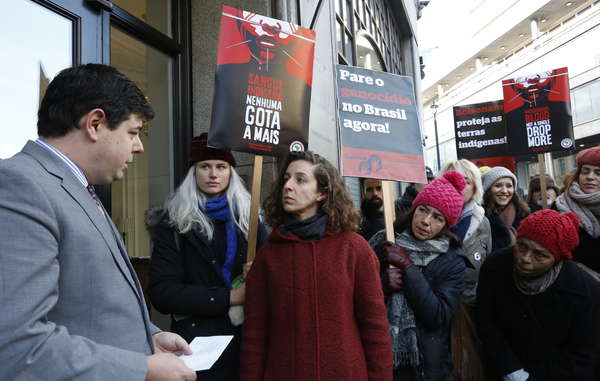
Protesters handed in a letter to Brazilian Embassy officials calling on President Bolsonaro to abandon his crackdown on indigenous rights. © Rosa Gauditano/APIB/Survival International
Before he was elected president, Mr Bolsonaro was
notorious for his racist views. Among his first acts on assuming power was to remove responsibility for indigenous land demarcation from Brazil’s Indigenous Affairs Department
FUNAI, and hand it to the notoriously anti-Indian Agriculture Ministry, which
Survival labelled “virtually a declaration of war against Brazil’s tribal peoples.”
President Bolsonaro also moved FUNAI to a new ministry of Women, Family and Human Rights headed by an evangelical preacher, a move designed to drastically weaken FUNAI.
Emboldened by the new President and his long history of anti-indigenous rhetoric, attacks by ranchers and gunmen against Indian communities have risen dramatically.
The territory of the Uru Eu Wau Wau Indians, for example, has been invaded, endangering uncontacted tribespeople there; and hundreds of loggers and colonists are planning to occupy the land of the Awá, one of Earth’s most threatened tribes.
But Brazil’s indigenous people have reacted with defiance. “We’ve been resisting for 519 years. We won’t stop now. We’ll put all our strength together and we’ll win,” said Rosilene Guajajara. And Ninawa Huni Kuin said: “We fight to protect life and land. We will defend our nation.”
APIB said: “We have the right to exist. We won’t retreat. We’ll denounce this government around the world.”
Survival International’s Director Stephen Corry said today: “Having suffered 500 years of genocide and massacres, Brazil’s tribal peoples are not going to be cowed by President Bolsonaro, however abhorrent and outdated his views are. And it’s been inspiring to see how many people around the world are standing with them.”
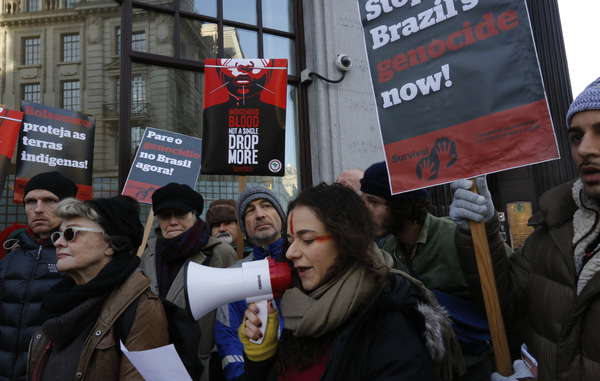
© Rosa Gauditano/APIB/Survival International
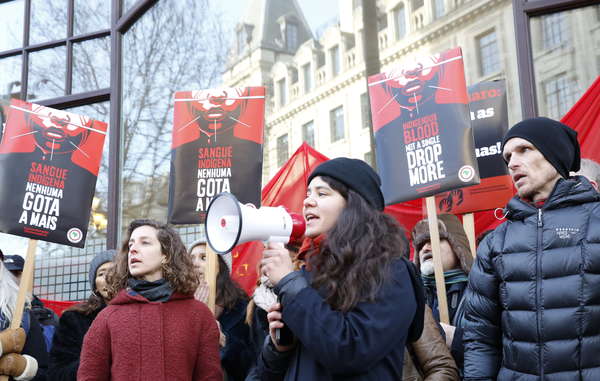
© Rosa Gauditano/APIB/Survival International
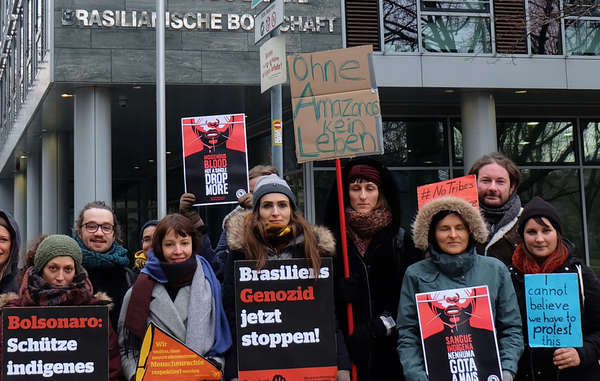
Protesters in Berlin, Germany outside the Brazilian Embassy. © Survival International
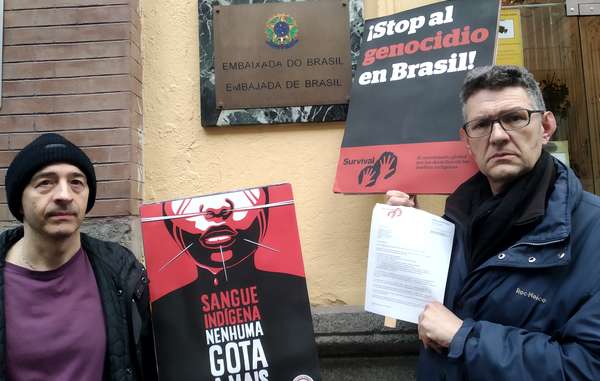
Protesters in Madrid, Spain handing a letter to the Brazilian Embassy, calling for an end to indigenous rights violations. © Survival International
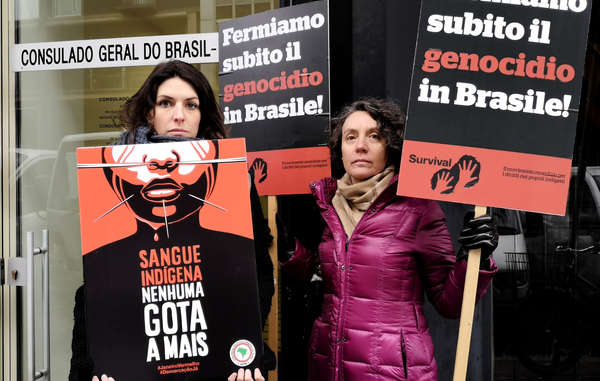
Protesters in Milan, Italy outside the Brazilian Consulate. © Survival International
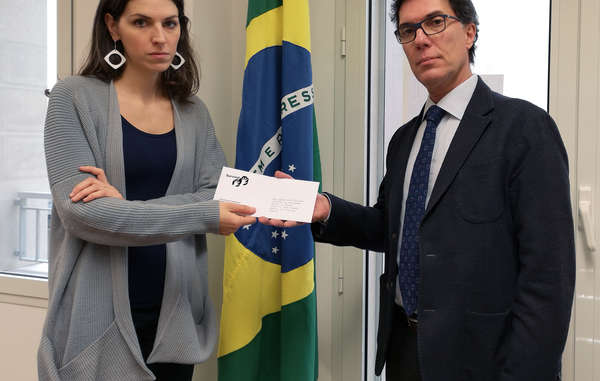
Survival protester hands in a letter to the Brazilian Consulate in Milan, Italy. © Survival International
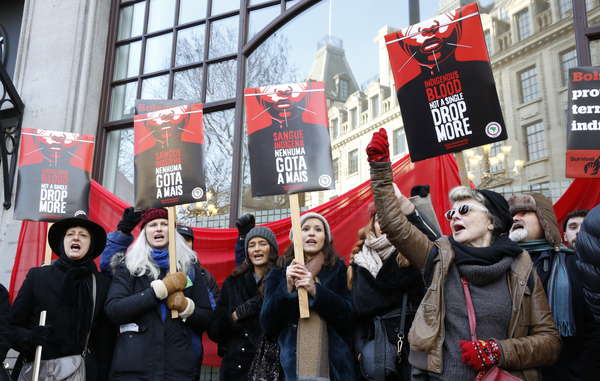
© Rosa Gauditano/APIB/Survival International
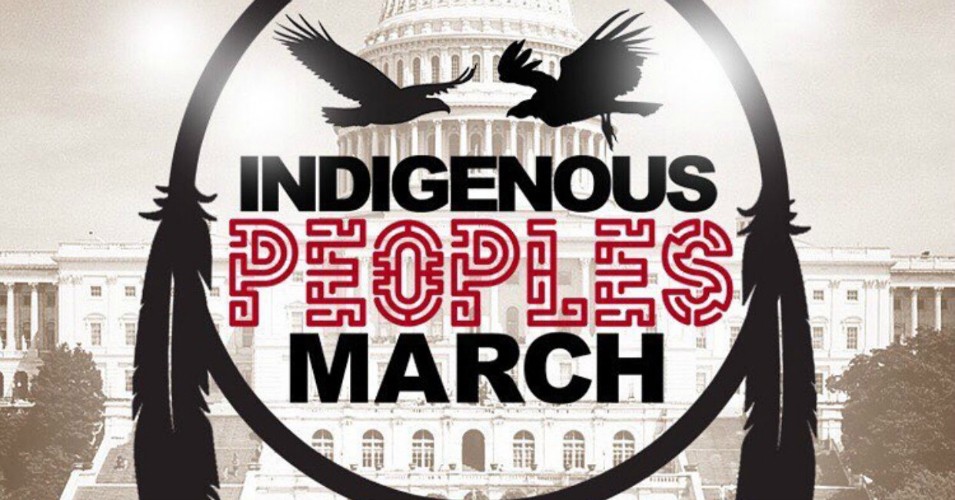
by Deep Green Resistance News Service | Jan 12, 2019 | Protests & Symbolic Acts
Featured image: On Jan. 18, an estimated 10,000 Indigenous activists and allies will descend on Washington, D.C. for the first-ever march to highlight human and civil rights abuses against Native communities. Photo by Indigenous Peoples Movement/Twitter. Many Indigenous people are victims of voter suppression, families divided by walls and borders, an environmental holocaust, sex and human trafficking, and police/military brutality.
by Jessica Corbett / Common Dreams
Raising alarm about human rights violations and the global climate crisis, activists from around the world are traveling to Washington, D.C. for the first annual Indigenous Peoples March, which will kick off at 8am local time on Jan. 18 outside the U.S. Department of the Interior’s main building.
“Our people are under constant threat, from pipelines, from police, from a system that wants to forget the valuable perspectives we bring to the table. But those challenges make us stronger. We look forward to gathering together and raising awareness.”
—Chase Iron Eyes, Lakota People’s Law Project
“It’s wonderful—and needed, now more than ever—to see so many tribes and organizations coming together to raise awareness about the ongoing need to preserve and respect the rights of Indigenous peoples,” said organizer Phyllis Young of the Lakota People’s Law Project.
Launched by the Indigenous Peoples Movement, a newly formed coalition dedicated to fostering positive change on “issues that directly affect our lands, peoples, and respective cultures,” the marchwill be preceded by a group prayer at 9am and followed by an evening fundraising concert at the Songbird Music House.
“Indigenous people from North, Central and South America, Oceania, Asia, Africa, and the Caribbean are a target of genocide,” the organizers charge. “Currently, many Indigenous people are victims of voter suppression, divided families by walls and borders, an environmental holocaust, sex and human trafficking, and police/military brutality with little or no resources and awareness of this injustice.”
More than 10,000 marchers are anticipated to descend on D.C. for the event, including people from Australia, Guatemala, Papua New Guinea, Canada, the Caribbean and across the United States. Those interested in participating or supporting the march can check for updates on the official Facebook event, and are encouraged to post updates to social media using the hashtags #IPMDC19 and #WHYIMARCH.
Chase Iron Eyes, lead counsel for the Lakota People’s Law Project, said in a statement on Wednesday that his delegation will also advocate for a Green New Deal—an increasingly popular proposal championed by the Sunrise Movement and other grassroots organizations as well as Rep. Alexandria Ocasio-Cortez (D-N.Y.) and a growing number of Democratic lawmakers that would pair climate and economic policies—”as a way to combat climate change and create green jobs, especially in Indian Country.”
“It’s going to be a beautiful day,” he said of the march. “Our people are under constant threat, from pipelines, from police, from a system that wants to forget the valuable perspectives we bring to the table. But those challenges make us stronger. We look forward to gathering together and raising awareness. We must remind the world, again, that Indigenous people matter. We are all made better when we respect one another and lift each other up.”
Iron Eyes’ comments come just a day after global protests spurred by outrage over the Canadian government’s support for TransCanada’s plans to build a fracked gas pipeline through unceded Wet’suwet’en territory, despite opposition to the project from First Nations leaders. Public anger ramped up on Monday afternoon, ahead of the demonstrations, after the Royal Canadian Mounted Police (RCMP) invaded a checkpoint established by Indigenous land defenders and arrested 14 of them.
Plans for the march also come amid growing concern over the presidency of Brazil’s Jair Bolsonaro, who was sworn in at the beginning of the year and has not wasted any time launching attacks on the environment and Indigenous communities in his country.
As Common Dreams reported, “On his first day in office, Bolsonaro introduced an executive order that will effectively take away land rights for indigenous Brazilians and descendants of former slaves and gave control of Amazon lands to the agriculture ministry; eliminated LGBTQ rights from the purview of the country’s human rights ministry; and set the minimum wage lower than the rate his predecessor’s government had budgeted for.”
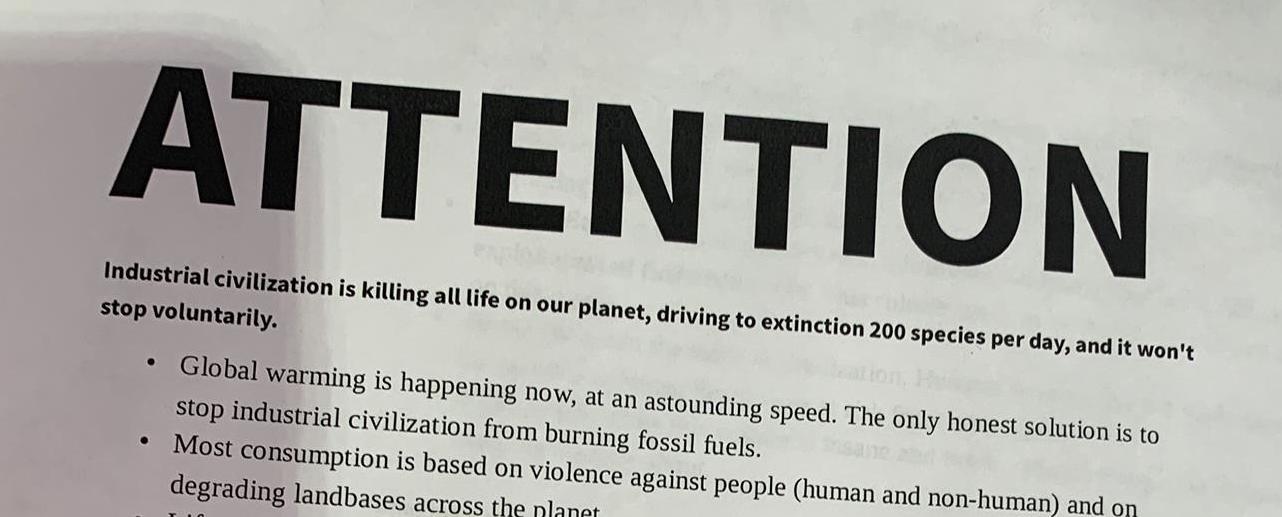
by DGR News Service | Dec 10, 2018 | Protests & Symbolic Acts
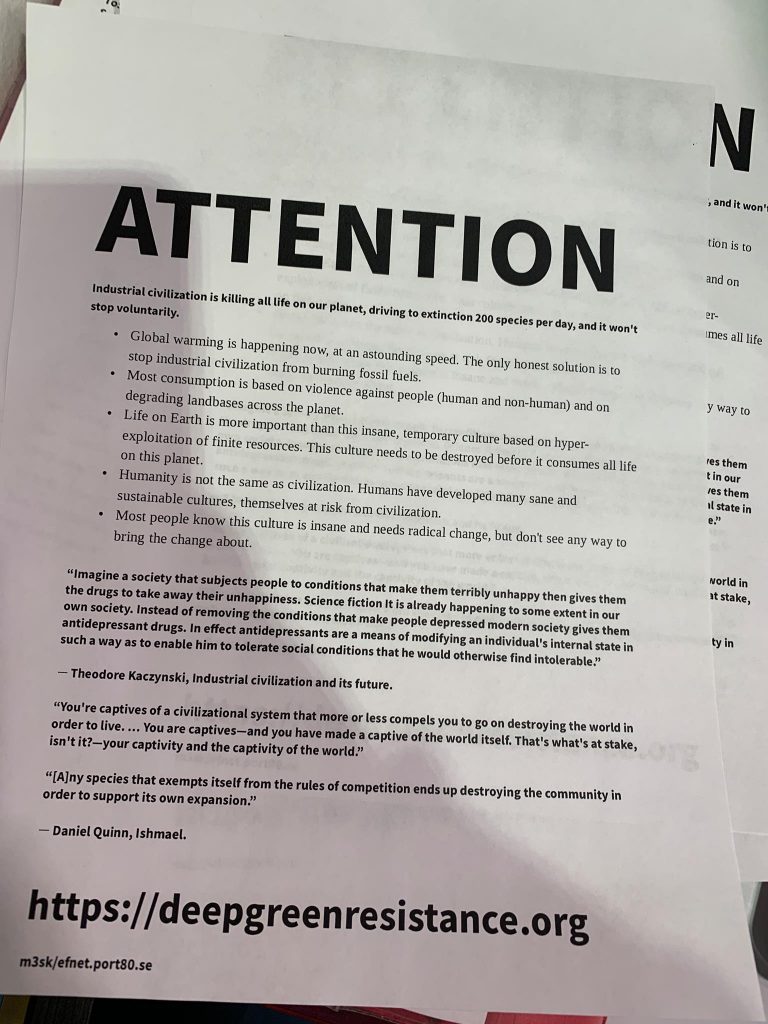
This photo shows the flyer in question, and was sent to us by a business making a complaint.
Over the past few days, several organizations from across the United States have reached out to Deep Green Resistance, letting us know about a printer exploit being used to print off DGR-themed flyers at their place of business.
These intrusions seem to be related to a larger wave of forced printings currently affecting unsecured printers (see: https://www.engadget.com/2018/11/30/pewdiepie-printer-hack-thehackergiraffe/).
We want to be very clear that these flyers are not official DGR material and have not been approved by us for publication anywhere, and certainly not on private printers without consent. The use of a Printer Exploitation Toolkit to hijack unprotected printers is unethical, unhelpful for anyone, and illegal.
At the moment, we are unsure who is behind these mailings. If this is the work of an unaffiliated DGR supporter, we ask that you please stop immediately and avoid such invasive, unhelpful behavior in the future. If these mailings are the work of agitators attempting to discredit our movement, we would ask that you please find something better to do with your time and stop wasting paper. Either way, we would like to apologize to anyone who has had to deal with this time-wasting stunt. Although we are unable to prevent every unstable or unscrupulous person from deciding to do stupid and unhelpful things, we are taking every step possible to make sure this doesn’t happen again. In the meantime, we encourage everyone – especially activists – to make sure their internet-connected devices are secure.
Here is the official recommendation on how to secure your printers against this type of attack: “Network administrators should never leave their printers accessible from the Internet and disable raw port 9100/tcp printing if not required” (more here).


